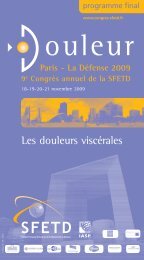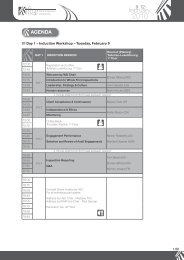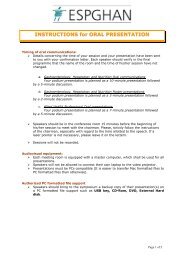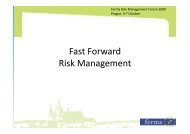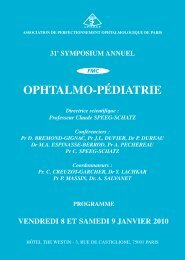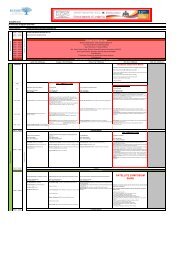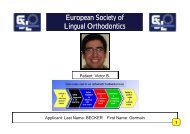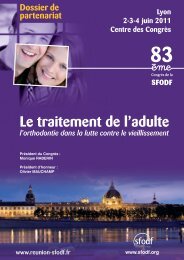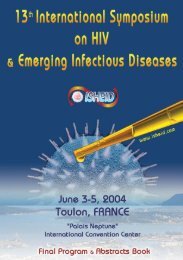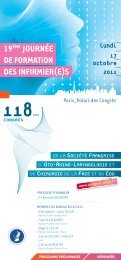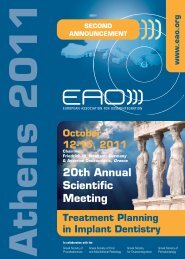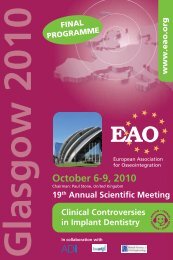final program.qxd - Parallels Plesk Panel
final program.qxd - Parallels Plesk Panel
final program.qxd - Parallels Plesk Panel
Create successful ePaper yourself
Turn your PDF publications into a flip-book with our unique Google optimized e-Paper software.
OP 4.2<br />
Development of Aprictabine<br />
Dr Susan Cox, Avexa, Richmond, Australia<br />
Background<br />
Apricitabine (ATC) is a deoxycytidine analogue in phase IIb development for the treatment<br />
of HIV infection. Prior to 2006 ATC was named variously as BCH10618, SPD754 and<br />
AVX754. In vitro and in vivo studies undertaken previously identified a promising<br />
tolerability profile, with antiretroviral activity against clinical isolates resistant to both 3TC<br />
and TAMs and a more than 1.6 log10 reduction in viral load over 10 days monotherapy in<br />
treatment naïve subjects. ATC is neither a substrate nor an inducer of CYP450<br />
isoenzymes and is principally eliminated as unchanged drug in the urine. ATC is dosed<br />
twice daily at present and is a candidate for the management of patients who are resistant<br />
to 3TC or FTC. An ongoing study is currently investigating the potential for ATC to<br />
provide superior antiretroviral activity to 3TC in the presence of the M184V mutation in<br />
reverse transcriptase. Studies have shown that co-administration of more than one<br />
deoxycytidine analogue may result in clinically significant antagonism. Avexa is presently<br />
completing a series of further in vitro and in vivo studies prior to initiation of a phase III<br />
clinical <strong>program</strong>.<br />
ABSTRACTS<br />
Methods<br />
Two in vitro studies have been completed to expand the understanding of the virological<br />
profile of ATC. In the first of these, HIV-1 (HXB2) harbouring M184V was repeatedly<br />
passaged with increasing concentrations of ATC in order to identify if ATC (which can<br />
maintain M184V in vitro) would select for further mutation in reverse transcriptase. In the<br />
second experiment the IC50s for ATC and approved NRTI were investigated against a<br />
panel of clinical isolates containing K65R in the presence or absence of M184V. Three<br />
further clinical pharmacology studies have either been completed or are ongoing. In the<br />
first of these studies 16 healthy volunteers were administered ATC 800 mg twice daily<br />
alone and with up to 960 mg per day of Septrin (Trimethoprim/Sulphamethoxazole).<br />
A second study is investigating the pharmacokinetics of ATC in the presence of steady<br />
state concentrations of a protease inhibitor, tipranavir. Finally a thorough QTC study is<br />
underway in accordance with regulatory guidance.<br />
Results<br />
Passaging M184V virus in the presence of ATC for up to 8 weeks did not result in the<br />
selection of further mutations in reverse transcriptase. The IC50s for other NRTI against<br />
K65R and M184V+K65R were within the range of fold changes from wild type previously<br />
reported elsewhere. For ATC the fold changes for K65R viruses ranged from 2.1 to 3.2<br />
and for K65R+M184V from 2.5 to 4.2, in agreement with previous data in the HXB2<br />
background. Co-administration of ATC with Septrin resulted in an increase in ATC<br />
AUC0-12 of 55% and in Cmax of 22%, similar to that seen previously for 3TC.<br />
Conclusions<br />
Apricitabine displays only limited fold changes in activity against HIV-1 viruses harbouring<br />
important resistance mutations in reverse transcriptase. Other than the known class<br />
interaction with other deoxycytidine nucleoside analogues, ATC shows little potential for<br />
meaningful interactions with other ART.<br />
“ Focusing FIRST on PEOPLE “ 45 w w w . i s h e i d . c o m



